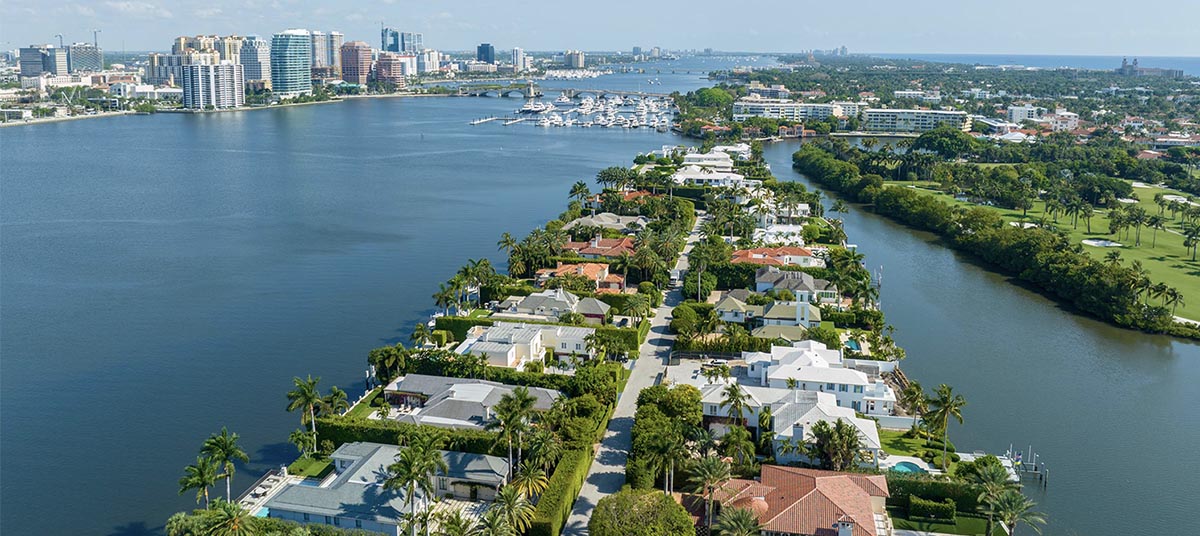Palm Beach's Rising Tax Stakes Amid Real Estate Surge

Palm Beach, a premium domain for millionaires and billionaires, is reeling under the influence of burgeoning property tax bills, inseparably linked with a surge in luxury real estate. According to a Bloomberg investigation, the number of parcels facing annual tax assessments exceeding $1 million has surged to at least 31 from a mere seven pre-pandemic. This explosion of wealth along Ocean Boulevard hasn't just attracted attention but also significantly bolstered local finances.

Million-dollar Tax Repercussions
In the previous financial year, Palm Beach County amassed $359 million in property taxes, marking a 75% increase since 2018. In Florida, a state devoid of income tax, this burgeoning revenue stream is pivotal for sustaining public utilities, education, and infrastructure. However, the implications extend far beyond fiscal matters, shaping socio-economic landscapes in novel ways.
“The emergence of a new cohort of exceptionally affluent residents in Palm Beach is steering a dramatic uptick in municipal revenue…”
These properties are no run-of-the-mill million-dollar sites; they are extravagant estates, private locales, and enigmatic compounds with soaring tax bills surpassing $10 million. Notably, hedge-fund mogul Ken Griffin faces one of the heftiest tax obligations.
The Pandemic's Wealth Migration Impact
This isn't an abrupt phenomenon. Fuelled by a post-COVID influx, Palm Beach has attracted high-net-worth individuals, especially from New York and other coastal cities. Between 2019 and 2024, property prices leapt 89%, with ultraluxe properties ($20 million+) experiencing a remarkable 500% rise. Even listings over $10 million noted a 400% increase.
This former seasonal retreat for traditional elites has converted into a year-round hub for hedge fund executives, cryptocurrency leaders, and tech innovators abandoning Tribeca lofts for coastal palaces. Some transactions occur off the MLS, with buyers swooping in, touring privately, and unflinchingly wiring millions. “It’s more than a boom,” quipped a luxury real estate agent. “It’s the reconfiguration of the nation’s tax demographic, one zip code at a time.”
Prosperous New Yorkers are swapping urban apartments for seaside estates, lured by Florida’s tax policies, eternal sunshine, and the emergent belief that Palm Beach isn’t solely exclusive—it’s indispensable in real estate portfolios. The outcome: unparalleled property value ascensions and a fresh wave of construction, ambition, and social maneuvering on every flawlessly groomed lawn.
Intriguing Estates & Billionaire Dynamics
Palm Beach’s elite real estate market resembles a gripping narrative. An undisclosed buyer—possibly Microsoft billionaire Charles Simonyi—is orchestrating the assembly of a $250 million-plus oceanfront locale north of Mar-a-Lago, reportedly acquiring adjacent estates with remarkable rapidity. In a high-profile plot twist, an attempt to purchase a mansion owned by Jon Bon Jovi ended in rock-star defiance, as per The Wall Street Journal.
The whole episode unfolds like a script from Succession: confidential offers, negotiations under NDAs, and a strategic billionaire game unfolding behind towering hedges and guarded estates.
In the meantime, Ken Griffin, Citadel's founder and Florida real estate's monarch, is expanding his dominion in Palm Beach. His extensive landholdings encompass multiple premier properties, spiking his annual property tax bill to over $10 million, an unprecedented record within the county. Insiders speculate his estate might ultimately rival Mar-a-Lago, accompanied by a tax burden capable of daunting most developers.

Growth Beyond Billionaire Borders
The real estate tumult in Palm Beach County transcends affluent estates. As of 2025, over $5 billion in new construction initiatives were integrated into tax records, contributing to a cumulative taxable valuation of $341 billion, a substantial 62% rise since 2020.
Yet, this boom surpasses billionaire precincts. West Palm Beach and Palm Beach Gardens witness bustling construction activity, with magnificent condo towers, lavish rentals, and mixed-use complexes transforming seemingly overnight. What were parking areas are metamorphosing into plazas, and tranquil suburban streets now accommodate high-end grocery outlets, rooftop dining, and multi-million dollar listings.
This escalation is fueled by nationwide migration, especially from high-tax regions, bringing not merely affluence but catalyzing cultural and architectural rejuvenation in the locale.
Balancing Public Benefits and Local Pressures
With increased tax revenues, Palm Beach County thrives financially, albeit not devoid of trials. Enhanced public amenities are accompanied by mounting infrastructure pressures. Facilities including educational institutions, roadways, and emergency services have to adapt to a locale now frequented seasonally by nine-figure tax contributors.
Local governance faces a dilemma: attracting revenue while ensuring luxury does not overshadow livability.
For Policymakers: The financial windfall fosters investment opportunities, spanning from coastal resilience to educational capacity enhancement, whilst cautious of exacerbating inequality.
For Residents: Improved services are probable; nonetheless, property taxes impose unparalleled expectations paired with development concerns.
For Buyers: The market, ablaze, sees tax liabilities matching property costs.
As Palm Beach undergoes its transition from a seasonal resort to a permanent haven for billionaires, its tax regime narrates a story—abundant in income, intricate in repercussions.
Want tax & accounting tips and insights?
Sign up for our newsletter.